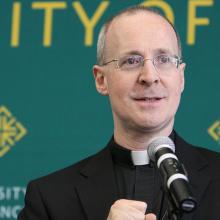Opinion

Image via Shawn/Flickr
The level of polarization is the worst I’ve ever seen in my 30 years as a Jesuit. And I think a lot of it has to do with the pushback, opposition, and downright contempt for my fellow Jesuit, Pope Francis. His emphasis on mercy, on accompaniment, on encounter and, especially, as in (his apostolic exhortation) “Amoris Laetitia,” on discernment, has driven some people into near hysterics.

Jemele Hill TED Talk
When asked about the tweet, Sanders replied, “I think that’s one of the more outrageous comments that anyone could make, and certainly something that I think is a fireable offense by ESPN.” There’s a revealing irony in this statement. I’m sure that Donald Trump and Sarah Huckabee Sanders do not think they are involved in white supremacy. I’m sure that they are not card-carrying members of any white supremacist group. But I’m also sure that they are unconsciously guided by white supremacy.
The remarkably human and loving response to imperiled neighbors in Houston stands in stark contrast against the hateful racial ugliness that paraded through the streets of Charlottesville earlier in the month as angry white supremacists — KKK, Neo Nazis, “alt-right” members — marched publicly and proudly without sheets shouting anti-black and anti-Semitic assaults, and ultimately led to the death of Heather Heyer. The lighted torches, fear, hate, and violence of Charlottesville was such a shameful juxtaposition to the self-sacrificial love and service across racial lines that the disasters caused by Hurricanes Irma and Harvey evoked from people.
“It is preposterous to claim that justice for immigrants isn’t central to Catholic teaching,” wrote Rogers. “It comes directly from Jesus Himself in Matthew 25, ‘For I was hungry and you gave me food … a stranger and you welcomed me.’ Immigrants and refugees are precisely the strangers we must welcome. This isn’t Catholic partisanship. The Bible is clear: welcoming immigrants is indispensable to our faith.”
It’s my prayer that the loudest voice in the room will become the voice of sanity. That the voice is a collective voice that can only come from a gathering of people humbled before God’s love and not from a Facebook post gone viral. This is the greatest hope we have, that we are not alone and we can face each other with dignity and respect. This way of thinking shifts the focus of our faith from internal to external, from institutional to missional. To borrow from Dr. King, none of us know what will happen to us, but we’ve been to the mountaintop and seen what’s around the bend. It is costly grace that will lead us home, into the very heart of God in which we all dwell together. Cheap grace will divide us as the lure of acceptance without repentance turns us inward to only forgive and to sanction what is most familiar while rejecting those whom are cast outside our circle of care.
It is easy to slip from defending the weak to attacking those Paul describes as the "weak person,” those who are attached to rituals and rules that are unnecessary but benign. If I allow myself to be drawn into self-righteousness, I find myself casting judgment for every little disagreement. I want to stop thinking of my opponents as my siblings in Christ. I want to do exactly what Paul cautions against when he says, "let us not pass judgment on one another any longer, but rather decide never to put a stumbling block or hindrance in the way of a brother" (Romans 14:13.)
Since the beginning of the year
I've had a fear of flying.
So much white anger in the air.
I can't breathe.
Enough of the church voted for a president that made such a decision among others, and those same churches, those same Christians, still uphold those decisions. As people who wish for a better America, we are called to remind one another that we belong to each other, no matter what race, religion, ethnicity, or sexual orientation.
We are calling on the people of faith to stand with our immigrant brothers and sisters and tell Congress to the DREAM Act — and we are inviting DACAmented youth to share your stories. We will be publish these at Sojourners and sharing them with our members of Congress.
President Donald Trump’s decision to deport our neighbors, students, coworkers, friends, and family is a great injustice. Although people can be given labels such as ‘alien,’ ‘immigrant,’ ‘undocumented,’ and ‘illegal,’ as Christians we should know that immigrants — regardless of their legal status — are individuals deeply loved by God and created in God’s Divine image.
Members of Trump’s council even told evangelical author and commentator Jonathan Merritt that they could not think of a comment or behavior that would trigger their resignation. It appears that any behavior, including serial adultery or sexual assault, is excusable to these leaders when committed by the president.
This present social climate presents a kairos moment for businesses pursuing social justice. In a recent New York Times interview, Apple CEO Tim Cook pointed out, “I think [business leaders] have a moral responsibility to help grow the economy, to help grow jobs, to contribute to this country and to contribute to the other countries that we do business in.” I wholeheartedly agree.
As I attempt to navigate my new normal after the traumatizing experience of standing up for love against white supremacy in Charlottesville, I am certain that empathy alone is not enough. True empathy, particularly in relation to social justice, must be followed by action. Otherwise, the cycle of marginalization, oppression, discrimination, and pain will continue.
While there are those who have embraced Swift’s new sound and video, many fans were horrified to witness “America’s sweetheart” claw herself out of her own grave. Perhaps the most startling image is the one in which Swift stands atop a mountain of past selves. It’s unnerving to watch the white T-shirt wearing “You Belong With Me” Swift lose her grip and fall with arms outstretched into the blackness.
Donald Trump’s fueling of racial fear and hate is being played out in our nation’s policies. Incredibly, Trump even justified the Arpaio pardon by saying it got high “ratings” from his constituency. He ran on a platform of anti-immigrant hostility — much like Arpaio — and his base is expecting him to deliver. And now 800,000 lives hang in the balance.
How does faith speak to the storms of life that are literal? This question comes into sharp focus as a massive tropical storm inundates a populous coastal area with endless rain and epic flooding. Before, during, and after dangerous weather events, dearly held beliefs face profound challenges.
Some of the common ground we should be able to affirm include:
Every initial of LGBTQ represents people who are beloved of God and made in the image of God.
Just as the cross has inspired millions of Christians to stand up for life, to fight for freedom and to come alongside victims of oppression, there have also been times when the cross has been twisted. And a twisted cross becomes a swastika.
A symbol of love can become a weapon. The icon of redemption can become an instrument of terror.
As President Trump has pointed out, others have made bad use of that same power, favoring cronies (Scooter Libby) and benefactors (Marc Rich.) He is right about that. Both of those made my stomach turn. I was a federal prosecutor when President Clinton pardoned Marc Rich, and it was infuriating — rewarding a fugitive cut against everything I worked for. In pardoning former Maricopa County Sheriff Joe Arpaio, though, Trump has done something worse: The president has not only rewarded someone who is unrepentant, but he has celebrated the crime itself. When asked about the pardon, Trump said of Arpaio that “He’s done a great job for the people of Arizona, he’s very strong on borders, very strong on illegal immigration, he is loved in Arizona ...”

Image via Gimas / Shutterstock.com
A starting point is recognizing the truth that war is never noble or courageous. Noble and courageous acts occur during war, but war itself is always the ultimate human failure and must never be portrayed as anything else. War is the expression of our worst impulses — killing and maiming one another while destroying the many good things we've built together.
















